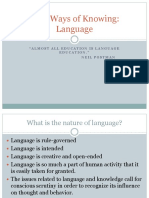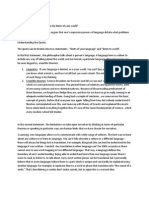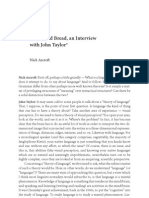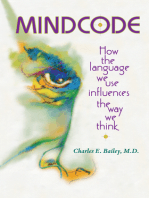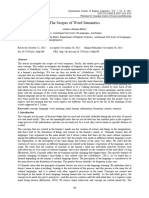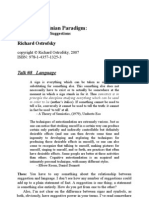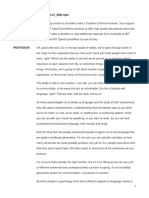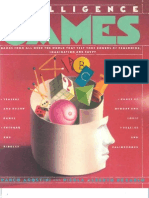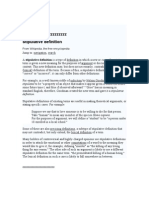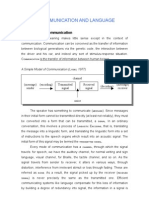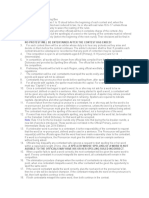Excerpt From: Louder Than Words: The New Science of How The Mind Makes Meaning
Excerpt From: Louder Than Words: The New Science of How The Mind Makes Meaning
Uploaded by
L. J.Copyright:
Available Formats
Excerpt From: Louder Than Words: The New Science of How The Mind Makes Meaning
Excerpt From: Louder Than Words: The New Science of How The Mind Makes Meaning
Uploaded by
L. J.Original Title
Copyright
Available Formats
Share this document
Did you find this document useful?
Is this content inappropriate?
Copyright:
Available Formats
Excerpt From: Louder Than Words: The New Science of How The Mind Makes Meaning
Excerpt From: Louder Than Words: The New Science of How The Mind Makes Meaning
Uploaded by
L. J.Copyright:
Available Formats
Print: Where does language come from? Print - Salon.
com
http://www.salon.com/2012/10/20/where_does_language_come_from/print/
http://www.salon.com/2012/10/20/where_does_language_come_from/ SATURDAY, OCT 20, 2012 5:00 PM UTC
How do we understand what words really mean? New science suggests we make meaning by creating mental simulations
BY BENJAMIN K. BERGEN
Excerpted from "Louder Than Words: The New Science of How the Mind Makes Meaning" Making meaning is one of the most important things we do. For starters, its something were doing almost constantly. We swim in a sea of words. Every day, we hear and read tens of thousands of them. And somehow, for the most part, we understand them. Constantly, tirelessly, automatically, we make meaning. Whats perhaps most remarkable about it is that we hardly notice were doing anything at all. There are deep, rapid, complex operations afoot under the surface of the skull, and yet all we experience is seamless understanding. Meaning is not only constant; its also critical. With language, we can communicate what we think and who we are. Without language, we would be isolated. We would have no fiction, no history, and no science. To understand how meaning works, then, is to understand part of what it is to be human.
(Credit: _marqs via iStock)
And not just human, but uniquely human. No other animal can do what we can with language. Of course, parts of human language have homologues in other animals. People talk fast, and sentences can be extremely complicated, but zebra finches sing tunes that rival our speed and complexity. Humans can drone on and on, but even a filibustering senator doesnt outlast humpback whales, whose songs can continue for hours. And although the human ability to combine words in new ways seems pretty unique, its seen on a more limited scale in bees, who dance messages to each other that combine information about the orientation, quality, and distance of food sources. For all these reasons, language has held a privileged spot in science and philosophy throughout history. For centuries, philosophers have asked, what is it that we humans have that our tongue-tied relatives dont? What cognitive capacities has evolution endowed us with that allow us to understand and appreciate sonnets and songs, exhortations and explanations, newspapers and novels? But for the most part, weve failed to answer the most important question of all. Almost no one, from lay people to linguists, really knows how meaning works. That is, until recently. This is the age of cognitive science. Using fine measures of reaction time, eye gaze, and hand movement, as well as brain imaging and other state-of-the-art tools, weve started to scrutinize humans in the act of communicating. We can now peer inside the mind and thereby put meaning in its rightful place at the center of the study of language and the mind. With these new tools, weve managed to catch a glimpse of meaning in action, and the result is revolutionary. The way meaning works is much richer, more complex, and more personal than we ever would have predicted. The Traditional Theory of Meaning The scientific study of meaning is still in its infancy. But even in the absence of solid empirical evidence, theories about how meaning works have developed and thrived. Over the years, most linguists, philosophers, and cognitive psychologists have come to settle on a particular story that probably isnt so different from your intuitive sense of meaning. When you contemplate meaning in your daily
1 of 3
10/21/2012 1:42 PM
Print: Where does language come from? Print - Salon.com
http://www.salon.com/2012/10/20/where_does_language_come_from/print/
life, its likely because youre wondering (or perhaps arguing about) what a given word means. It might be a word in your own language: What does obdurate mean? (Stubbornly persistent in wrongdoing, in case you were wondering.) Or it could be a word in another language: What does the formidable German word Geschwindigkeitsbegrenzung mean? (Speed limit.) In general, youre probably most aware of meaning when youre thinking about definitions. This is also the starting point for the traditional theory of meaning: Words have meanings that are like definitions in your mind. What would it be like if meaning worked this way? When you think about it, a definitional meaning would need to have two distinct parts. The first is the definition itself. This is a description of what the word means. Its articulated in a particular language, like English, and is supposed to be a usable characterization of the meaning. But theres a second part, too, which is implicit. The definition characterizes something in the world. So speed limit refers to something that exists in real life, independent of your knowledge about it whether you know that theres a speed limit, or what it is, you can still get pulled over for driving faster than the number on the sign. So both the mental definition and the actual thing in the world that the word refers to are each critical parts of the meaning of a word. Many philosophers have taken it as a given that these two parts are all you need to characterize meaning. And theyve gone on to argue for centuries about which of the two parts is more importantthe mental definition or the real world. But the important question for our purposes to understand how people understand is to ask how a definitional theory of meaning like this could explain the things we do with language. Do we really have these definitions in our minds? If so, where do they come from? How could we use them to plan a sequence of words? How could we use them to understand something that someone else has said? This is where things get a little more complicated. As with any definition, your mental definitions would presumably need to be articulated in some language. But what language? Your first thought might be that it should be your native language. Except, when you follow that idea to its logical conclusion, theres a problem. If English words are defined in your mind in terms of other English words, then how do you understand the definitions themselves? You end up going in circles. One solution to this problem is to suppose that we have some other system in our mind some way to encode ideas and thoughts and reasoning that doesnt use English or any real language. This mental language would need to have a lot of the stuff that a real language has it would still have to be able to refer to things in the world, as well as properties, relations, actions, events, and so on anything that we can think about and understand language about. In other words, we might be thinking using something like a language of thought or Mentalese. Simply stated, the language of thought hypothesis is that the meanings of words and sentences in any real language are articulated in peoples minds in terms of this other, mental language. Mentalese is supposed to be like a real language in that there are words that mean things and can combine with one another, but, unlike a real language, it doesnt sound like anything or look like anything. But even if Mentalese gets us out of the vicious circle of words defined in terms of other words, it still only gets us part way to meaning. Thats because it doesnt deal with the other half of a definitional theory of meaning the things in the world that the Mentalese words refer to. According to the language of thought hypothesis, the words of Mentalese are related to the world through a symbolic relationship. Over the centuries, this has come to be the leading idea about how meaning works. Words are meaningful because you have mental definitions for them articulated in Mentalese that match up to things in the real world. Embodied Simulation But if you look a little closer at the language of thought hypothesis, youll find that there are actually some holes in it. The biggest one is that Mentalese doesnt actually solve the problems inherent in a definitional theory of meaning it simply pushes them back a level. The issue is akin to the earlier question of how an English definition of an English word could ever mean anything. Namely: How do we know what the words in Mentalese mean? This is one of the big problems with the language of thought hypothesis. And when you start to apply a little pressure, other cracks start to appear. For one, where does Mentalese come from? If its something thats learned, then it certainly cant be learned through ones native language, because that creates another vicious cycle: How could we learn Mentalese based on English if we only understand English through Mentalese? Starting as early as the 1970s, some cognitive psychologists, philosophers, and linguists began to wonder whether meaning wasnt something totally different from a language of thought. They suggested that instead of abstract symbols meaning might really be something much more closely intertwined with our real experiences in the world, with the bodies that we have. As a self-conscious movement started to take form, it took on a name, embodiment, which started to stand for the idea that meaning might be something
2 of 3
10/21/2012 1:42 PM
Print: Where does language come from? Print - Salon.com
http://www.salon.com/2012/10/20/where_does_language_come_from/print/
that isnt distilled away from our bodily experiences but is instead tightly bound by them. Its not clear who had the idea first, but in the mid-1990s at least three groups converged upon the same thought. The idea was the embodied simulation hypothesis, a proposal that would make the idea of embodiment concrete enough to compete with Mentalese. Put simply: Maybe we understand language by simulating in our minds what it would be like to experience the things that the language describes. Lets unpack this idea a little bit what it means to simulate something in your mind. We actually simulate all the time. You do it when you imagine your parents faces or fixate in your minds eye on that misplayed poker hand. Youre simulating when you imagine sounds in your head without any sound waves hitting your ears, whether its the bass line of the White Stripes Seven Nation Army or the sound of screeching tires. And you can probably conjure up simulations of what strawberries taste like when covered with whipped cream or what fresh lavender smells like. You can also simulate actions. Now, in all these examples, youre consciously and intentionally conjuring up simulations. Thats called mental imagery. The idea of simulation is something that goes much deeper. Simulation is an iceberg. By consciously reflecting, as you just have been doing, you can see the tip the intentional, conscious imagery. But many of the same brain processes are engaged, invisibly and unbeknownst to you, beneath the surface during much of your waking and sleeping life. Simulation is the creation of mental experiences of perception and action in the absence of their external manifestation. That is, its having the experience of seeing without the sights actually being there or having the experience of performing an action without actually moving. When were consciously aware of them, these simulation experiences feel qualitatively like actual perception; colors appear as they appear when directly perceived, and actions feel like they feel when we perform them. The theory proposes that embodied simulation makes use of the same parts of the brain that are dedicated to directly interacting with the world. The idea is that simulation creates echoes in our brains of previous experiences, attenuated resonances of brain patterns that were active during previous perceptual and motor experiences. We use our brains to simulate percepts and actions without actually perceiving or acting. In this context, the embodied simulation hypothesis doesnt seem like too much of a leap. It hypothesizes that language is like these other cognitive functions in that it, too, depends on embodied simulation. The idea is that you make meaning by creating experiences for yourself that, if youre successful, reflect the experiences that the speaker or the writer intended to describe. Meaning, according to the embodied simulation hypothesis, isnt just abstract mental symbols; its a creative process, in which people construct virtual experiences embodied simulations in their minds eye. Excerpted with permission from Louder Than Words: The New Science of How the Mind Makes Meaning by Benjamin K. Bergen. Available from Basic Books, a member of The Perseus Books Group. Copyright 2012.
Copyright 2011 Salon.com. All rights reserved.
3 of 3
10/21/2012 1:42 PM
You might also like
- Adam's Tongue: How Humans Made Language, How Language Made HumansFrom EverandAdam's Tongue: How Humans Made Language, How Language Made HumansRating: 4 out of 5 stars4/5 (21)
- Brown Caroline ch1 PDFDocument29 pagesBrown Caroline ch1 PDFRostinahIblani100% (1)
- Theories of Human Communication Flashcards PDFDocument18 pagesTheories of Human Communication Flashcards PDFamandaalishaNo ratings yet
- Ways of Knowing Language-2f9189vDocument42 pagesWays of Knowing Language-2f9189vapi-327987169No ratings yet
- The Nature of LanguageDocument21 pagesThe Nature of LanguageJoyce Tobar100% (2)
- Devitt Language and Reality Introduction 1Document12 pagesDevitt Language and Reality Introduction 1Brad FieldsNo ratings yet
- The Limits of Your Language Are The Limits of Your WorldDocument2 pagesThe Limits of Your Language Are The Limits of Your WorldShipali RanjanNo ratings yet
- Butter and Bread, An InterviewDocument17 pagesButter and Bread, An InterviewTamara StojanovicNo ratings yet
- Tarea 1 - Edinson Leen Gonzalez Laguna PDFDocument7 pagesTarea 1 - Edinson Leen Gonzalez Laguna PDFLeen LiinNo ratings yet
- The Search For A Unified Theory of Language Learning: 7 Great Theories About Language Learning by Brilliant ThinkersDocument5 pagesThe Search For A Unified Theory of Language Learning: 7 Great Theories About Language Learning by Brilliant ThinkersjamesramilNo ratings yet
- Theoretical QuestionsDocument27 pagesTheoretical QuestionsAruNo ratings yet
- 1. Introduction to psycholinguistics-1 (2)Document13 pages1. Introduction to psycholinguistics-1 (2)MohammedBarmakiNo ratings yet
- Plato's ProblemDocument4 pagesPlato's ProblemJhea VelascoNo ratings yet
- Theories of Language AcquisitionDocument26 pagesTheories of Language AcquisitionAsad MehmoodNo ratings yet
- 1. Introduction to psycholinguistics (1)Document10 pages1. Introduction to psycholinguistics (1)MohammedBarmakiNo ratings yet
- 1995 Thinking Allowed Steven PinkerDocument13 pages1995 Thinking Allowed Steven PinkerThach VoNo ratings yet
- Cognitive Psychology (Document5 pagesCognitive Psychology (Ayesha Jalal KhanNo ratings yet
- 7 Great Theories About Language Learning by Brilliant ThinkersDocument8 pages7 Great Theories About Language Learning by Brilliant ThinkersLea Camille Basug PacleNo ratings yet
- Chomsky Noam.-Silent Children, New Language 1Document7 pagesChomsky Noam.-Silent Children, New Language 1Alan ZaxoyiNo ratings yet
- Psycholinguistics INTRODUCTIONDocument7 pagesPsycholinguistics INTRODUCTIONDRISS BAOUCHE100% (1)
- PragmaDocument4 pagesPragmaMade JulianiNo ratings yet
- Units 1-4 Unit 1Document5 pagesUnits 1-4 Unit 1MariaNo ratings yet
- Introduction To Linguistics: Language and GestureDocument4 pagesIntroduction To Linguistics: Language and GestureErick RojasNo ratings yet
- Theories of The Early Stages of LanguageDocument7 pagesTheories of The Early Stages of LanguageErmalyn Saludares MunarNo ratings yet
- Can We Think Without Language 11Document7 pagesCan We Think Without Language 11kankshNo ratings yet
- Reflection PaperDocument5 pagesReflection PaperRara FauziaNo ratings yet
- Mind Code: How the Language We Use Influences the Way We ThinkFrom EverandMind Code: How the Language We Use Influences the Way We ThinkRating: 5 out of 5 stars5/5 (2)
- Your Clean Language Questions AnsweredDocument58 pagesYour Clean Language Questions AnsweredSamurai100% (1)
- Language TheoriesDocument5 pagesLanguage TheoriesBever LyNo ratings yet
- Transcript S Pinker VidDocument15 pagesTranscript S Pinker VidIs MontañaNo ratings yet
- International Baccalaureate - TOK EssayDocument6 pagesInternational Baccalaureate - TOK EssayAlan DengNo ratings yet
- 7 Great Theories About Language LearningDocument7 pages7 Great Theories About Language LearningJoanna MarieNo ratings yet
- 5 - Characteristics of CommunicationDocument10 pages5 - Characteristics of CommunicationShiv ParmarNo ratings yet
- Course in SemanticsDocument29 pagesCourse in Semanticsmarija12990No ratings yet
- Lera Boroditsky Is An Assistant Professor of Psychology at Stanford University and Editor inDocument5 pagesLera Boroditsky Is An Assistant Professor of Psychology at Stanford University and Editor inАнжелика БезручкоNo ratings yet
- Meaning (Muñoz & Rojo 2018)Document18 pagesMeaning (Muñoz & Rojo 2018)ZogoibiNo ratings yet
- MAED English Language AquisitionDocument5 pagesMAED English Language Aquisitionkerrin galvezNo ratings yet
- Linguistics LectureDocument39 pagesLinguistics LectureDanifer AnciadoNo ratings yet
- Steven Pinker Video TranscriptDocument14 pagesSteven Pinker Video TranscriptDexNo ratings yet
- Language and CultureDocument7 pagesLanguage and CultureBruno FilettoNo ratings yet
- The Scope of Word SemanticsDocument7 pagesThe Scope of Word Semanticsana.92marlianaNo ratings yet
- Pennebaker 2011 New Scientist, The Secret Life of PronounsDocument7 pagesPennebaker 2011 New Scientist, The Secret Life of PronounsCesarNo ratings yet
- C - Kreidler Introducing English Semanticsbookfi-Org 21Document28 pagesC - Kreidler Introducing English Semanticsbookfi-Org 21Sirajul Firdaus0% (1)
- Units 1-4 Unit 1Document3 pagesUnits 1-4 Unit 1MariaNo ratings yet
- Pragmatics PruposeDocument12 pagesPragmatics PruposeShahzad DilshadNo ratings yet
- Critical Analysis of Edward Sapir'S Definition of Language: Lahore University of Future EducationDocument6 pagesCritical Analysis of Edward Sapir'S Definition of Language: Lahore University of Future EducationCH Abdul MajidNo ratings yet
- Relevant Linguistics, Ch. 1 Relevant Linguistics, Ch. 1Document12 pagesRelevant Linguistics, Ch. 1 Relevant Linguistics, Ch. 1Isaac MoralesvasNo ratings yet
- The Child and the World: How the Child Acquires Language; How Language Mirrors the WorldFrom EverandThe Child and the World: How the Child Acquires Language; How Language Mirrors the WorldNo ratings yet
- Speech, Thought EtcDocument19 pagesSpeech, Thought EtcMARTIN AYONo ratings yet
- ED Paradigm 08 - LanguageDocument16 pagesED Paradigm 08 - LanguageRichard OstrofskyNo ratings yet
- Language Is A Construct Humans Work in Every Day To Express A Wide Range of EmotionsDocument5 pagesLanguage Is A Construct Humans Work in Every Day To Express A Wide Range of EmotionsDharsinero SabandalNo ratings yet
- (Noam Chomsky) On Language and CultureDocument6 pages(Noam Chomsky) On Language and Culturem_linguistNo ratings yet
- Introduction To Thinking at The Edge by Eugene T. Gendlin, PH.DDocument5 pagesIntroduction To Thinking at The Edge by Eugene T. Gendlin, PH.DZaq MosherNo ratings yet
- Semantics and Theories of SemanticsDocument15 pagesSemantics and Theories of SemanticsAnonymous R99uDjYNo ratings yet
- Purposivecopy FinalsDocument28 pagesPurposivecopy FinalsDemie Victoria M BantiqueNo ratings yet
- The Cipher of GenesisDocument20 pagesThe Cipher of GenesisWISE ShabazzNo ratings yet
- G Re 7 Dy 2 HSTGDocument28 pagesG Re 7 Dy 2 HSTGsanderlord1No ratings yet
- A Century Not Out - Issue 100 - Philosophy NowDocument2 pagesA Century Not Out - Issue 100 - Philosophy NowBanderlei SilvaNo ratings yet
- The Relationship Between Language and ThoughtDocument7 pagesThe Relationship Between Language and ThoughthimkeradityaNo ratings yet
- Mohanty, Individual Fact and EssenceDocument10 pagesMohanty, Individual Fact and EssenceSergio Pérez GaticaNo ratings yet
- Terminology: Lect. Raluca Ghentulescu, PHDDocument53 pagesTerminology: Lect. Raluca Ghentulescu, PHDAndreea Dinu100% (1)
- Intelligence GamesDocument179 pagesIntelligence GamesPlayFish100% (4)
- Duns Scotus. Ordinatio 2 D. 3 P. 1 Qq. 5-6Document22 pagesDuns Scotus. Ordinatio 2 D. 3 P. 1 Qq. 5-6ChuckyChuck LscNo ratings yet
- ZZZZZZZZZZZZZZZZZZZZZZ Stipulative Definition: From Wikipedia, The Free EncyclopediaDocument10 pagesZZZZZZZZZZZZZZZZZZZZZZ Stipulative Definition: From Wikipedia, The Free Encyclopediaapi-27788847No ratings yet
- LAS Module 4 Quarter 4Document4 pagesLAS Module 4 Quarter 4Jenifer PraycoNo ratings yet
- Defining "Religion"Document19 pagesDefining "Religion"fwoobyNo ratings yet
- The Concept PaperDocument3 pagesThe Concept PaperzwendypieNo ratings yet
- Hu Dec Like ProductDocument20 pagesHu Dec Like ProductFildza Nabila AviantiNo ratings yet
- Notes-PR - CH 1 2017 PDFDocument7 pagesNotes-PR - CH 1 2017 PDFJAMES NZIOKANo ratings yet
- PP Quarter 4 Module 4Document83 pagesPP Quarter 4 Module 4Dennis AngeloNo ratings yet
- Lesson 1 SemanticsDocument42 pagesLesson 1 Semanticsmjgvalcarce100% (9)
- Arts 1 Study Guide 1Document2 pagesArts 1 Study Guide 1Alex OzfordNo ratings yet
- Concept of ViolenceDocument14 pagesConcept of ViolenceRafael SOaresNo ratings yet
- Excerpt From: Louder Than Words: The New Science of How The Mind Makes MeaningDocument3 pagesExcerpt From: Louder Than Words: The New Science of How The Mind Makes MeaningL. J.No ratings yet
- Concept Paper BoondocksDocument2 pagesConcept Paper BoondocksshindigzsariNo ratings yet
- Proverbs: Practical Work Difficulties in TranslationDocument17 pagesProverbs: Practical Work Difficulties in TranslationСоня ПоздноеваNo ratings yet
- How To Define Business Terms PrimerDocument26 pagesHow To Define Business Terms PrimerRaghuNo ratings yet
- Sách GT Reading Writing 6Document93 pagesSách GT Reading Writing 6hachi.2003.vn100% (1)
- English: Quarter 4 - Module 2: Giving Technical and Operational DefinitionsDocument18 pagesEnglish: Quarter 4 - Module 2: Giving Technical and Operational DefinitionsLiane Venice Napao InganNo ratings yet
- Basic Writing Skills 2021: Essentials of Paragraph WritingDocument21 pagesBasic Writing Skills 2021: Essentials of Paragraph WritingKiru100% (1)
- GS Module 3 ConcessionDocument3 pagesGS Module 3 ConcessionManolacheNo ratings yet
- EAPP - Module1.Quarter 1 - Week 2Document14 pagesEAPP - Module1.Quarter 1 - Week 2Jrick EscobarNo ratings yet
- Basic Research MethodsDocument62 pagesBasic Research MethodsPeter KoechNo ratings yet
- Lazni Prijatelji - SLODocument15 pagesLazni Prijatelji - SLOMalalanaNo ratings yet
- 5 Thesis Statements ExamplesDocument7 pages5 Thesis Statements Examplesdawnmorasalem100% (2)
- Rules and Regulation of Spelling BeeDocument3 pagesRules and Regulation of Spelling BeePen TuraNo ratings yet
- St. Thomas On The Object of Geometry - Smith, Vincent EdwardDocument122 pagesSt. Thomas On The Object of Geometry - Smith, Vincent EdwardSilvio Jr.No ratings yet




